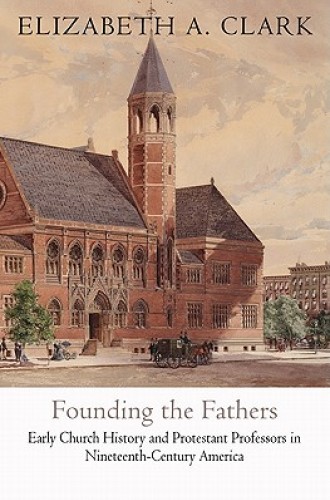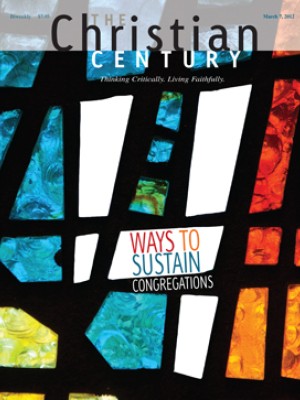Founding the Fathers, by Elizabeth A. Clark
Elizabeth Clark is known for her pioneering studies of late antiquity. Her Reading Renunciation places the practice of reading at the center of early Christian asceticism and asks how monks read their own agenda into and out of a text—the Bible—that seems to offer only limited support for asceticism. A volume she edited, Women in the Early Church, brings together texts by Augustine, John Chrysostom and others. ("The most fitting word with which to describe the Church Fathers' attitude toward women," writes Clark in her introduction, "is ambivalence.") Her Ascetic Piety and Women's Faith looks at the place of women in the church in the fourth and fifth centuries. Now Clark has turned her attention to the academic history of early church history. In Founding the Fathers, a deeply researched and illuminating monograph, she examines the development of early church history as a field of research and teaching in the 19th-century United States.
Clark focuses on six professors who taught at four institutions of theological education (Princeton Theological Seminary, Harvard Divinity School, Yale Divinity School and Union Theological Seminary). These six scholars, she shows, contributed significantly to the creation of an English-language historiography of the early church: two of them, for example, published editions of the Didache in 1884 and 1885. Perhaps more important, working without the resources that many history professors today take for granted (large libraries, ready access to primary sources), Clark's professors shaped the historical imaginations of countless students, most of them future pastors.
Read our latest issue or browse back issues.
The professors' study of and teaching about the church fathers was not a disinterested enterprise. All of the schools Clark considers are Protestant, and their faculty enlisted the church fathers "as allies or opponents in contemporary denominational battles over religious belief and practice and in the culture wars of the day." Sometimes the professors called on early church precedent as imprimatur for 19th-century practices. In other cases, they argued that the early church had deviated from a biblical norm that 19th-century Protestant churches resurrected. In both modes of argumentation, the scholars asked history to underwrite present-day concerns.
The professors' chief antagonists were the Roman Catholic Church and, to a slightly lesser extent, the Episcopal Church. The professors argued that bishops were a relatively late innovation. Princeton's Samuel Miller claimed that the episcopacy did not emerge until the fourth century. But even those historians who granted the episcopacy a somewhat earlier genesis emphasized that there was no divine sanction for it, and they described early bishops who were not overly hierarchical but whose leadership was more consistent with republican forms of governance.
The historians who animate Founding the Fathers were also exercised about asceticism (which, Clark notes, seemed threatening in part because a small group of high church Anglicans were founding monastic communities). Because the professors, in Clark's words, "believed that God guided all history," they tried to find something positive to say about asceticism: monks preserved manuscripts and developed novel agricultural practices that stimulated the economy. But in the main, the professors thought, asceticism was selfish—monks devoted their energies to purifying their own souls, not to spreading the gospel. And though the monastic life may aim to stamp out sin, it actually creates new temptations: celibacy, wrote one historian, was always "followed by the shadow of immorality, sodomy and all the rest." Egyptian asceticism, argued Union Seminary's Philip Schaff, "is incompatible with cleanliness and decency, and delights in filth. It reverses the maxim of sound evangelical morality and modern Christian civilization, that cleanliness is next to godliness."
Schaff's words suggest how historians drew on antiquity to bolster not just Protestant polity but also broader 19th-century social and cultural arrangements. In particular, Clark argues that the professors put church history to the service of contemporary domesticity. The New Testament, the professors believed, envisioned harmonious families characterized by companionate marriage, a somewhat elevated role for women, and kindly patriarchal leadership. In earlier eras, deviant asceticism had threatened that domestic norm. In the 19th century, the threat came from the movement for women's suffrage—which, in Schaff's view, promised to thrust a woman into "the whirl of public activity, from which she instinctively shrinks." Contra both monks and suffragettes, a properly Christian home modeled on the New Testament teachings of Jesus allowed women to flourish in their "natural sphere of subordination and domestic life" and shielded them from "the wildest excesses of ultra democracy" and "the full equalization . . . of both sexes," which "ends in the flesh."
Similarly, the professors were critical of 19th-century Catholic Mariology, which, they charged, deviated from both biblical witness and early church precedent. They argued that Christians did not begin to "worship" Mary until the fourth and fifth centuries and that no one contemplated an immaculate conception until the 12th century. These accretions were heretical, the American scholars argued, and ironically prevented Christians from appreciating Mary for who she really was—not a purveyor of salvation so much as the "ideal of all womanhood," a model of feminine humility and familial sympathy.
The punch of Clark's argument is that patristics, which many of us tend to think of as a highly enlightened and even objective field of study, was developed in part as a response to a set of 19th-century American concerns—domesticity, Protestant polity and, shadowing it all, anti-Catholicism (albeit an anti-Catholicism that always carried with it a certain longing for Catholicism). In Reading Renunciation, Clark wrote that she wished to align herself "with those theorists and commentators who scrutinize the social location of writings and the institutional structures that variously support or challenge them." She did that for the asceticism of the early church, and she has done it again for 19th-century patristics scholars. The resulting study is rich and eye-opening.







